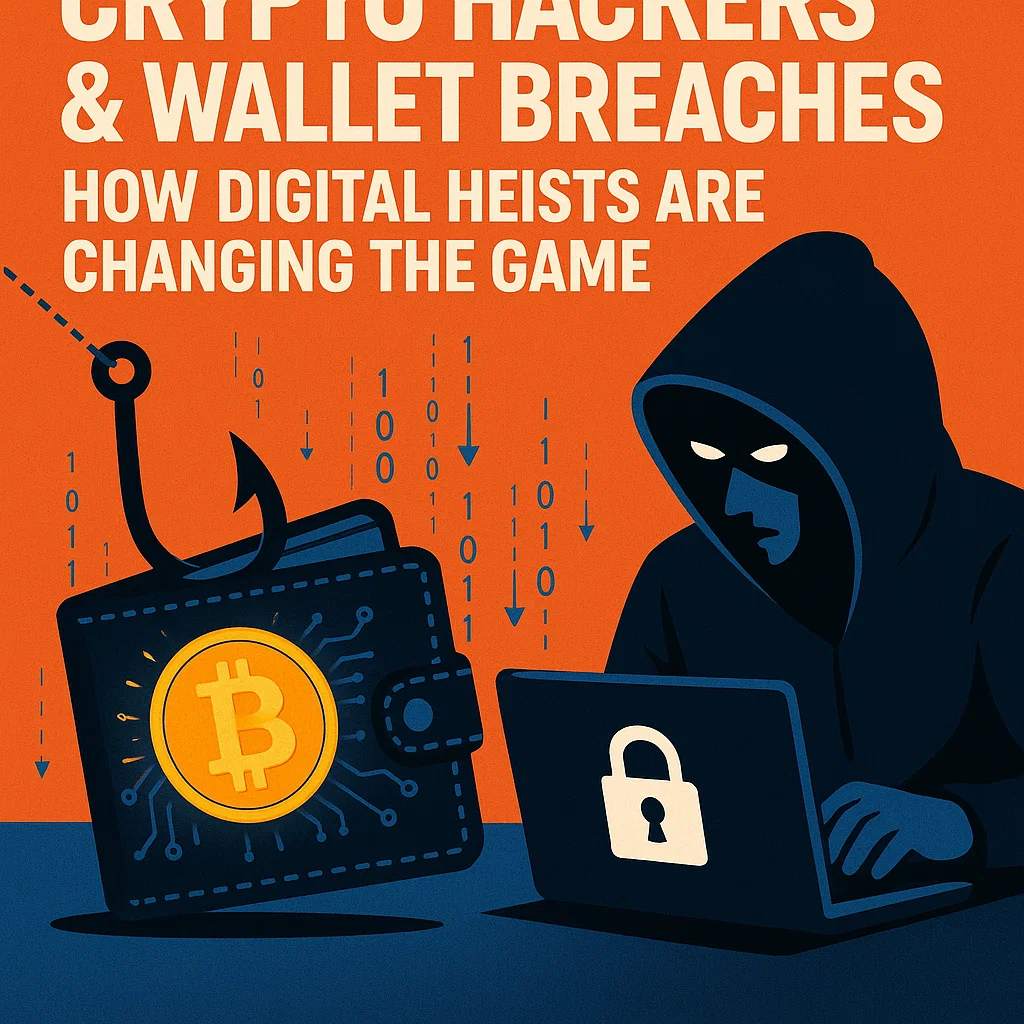Imagine waking up one day to find your entire crypto portfolio wiped out. Your Bitcoin, Ethereum, maybe even a rare NFT—all gone. No calls from your bank, no alerts—just vanishing digits on a screen. Welcome to the ruthless world of crypto hackers.
With the rise of cryptocurrency, there’s been an equal rise in cybercriminals who view digital wallets as virtual treasure chests. But it’s not just villains in hoodies in dark basements—it’s an intricate web of smart hackers, sometimes ethical, sometimes not, each playing a part in this evolving saga.
Who Are Crypto Hackers?
Crypto hackers are digital thieves who specialize in breaching cryptocurrency systems and wallets. But it’s not all black and white. They fall into three main categories:
-
Black Hat Hackers: Malicious, criminal hackers stealing crypto for personal gain.
-
White Hat Hackers: Ethical hackers who find and fix vulnerabilities.
-
Grey Hat Hackers: They test limits, sometimes breaching systems without permission, but without malicious intent.
Their motives range from financial gain to political activism, or even just showing off their technical prowess.
The Dark World of Crypto Hacking

Methods Hackers Use to Steal Crypto
Crypto hackers are endlessly creative. Some of the most common attack methods include:
-
Phishing: Fake emails or websites to steal your private keys.
-
SIM Swapping: Hijacking your phone number to access 2FA codes.
-
Malware: Sneaky software that spies on your keyboard or clipboard.
-
Fake Wallets: Malicious apps that pose as trusted wallets.
Popular Targets
-
Hot Wallets (connected to the internet)
-
Centralized Exchanges like Binance, Coinbase, etc.
-
DeFi Protocols with unpatched vulnerabilities
-
New Crypto Investors who lack basic security knowledge
The Infamous Coinbase Hack
In 2021, over 6,000 Coinbase accounts were compromised in a massive hack. Attackers used a flaw in Coinbase’s two-factor authentication system to access funds.
How Did It Happen?
Hackers used phishing emails to collect credentials, then bypassed SMS-based 2FA to drain wallets. Coinbase later reimbursed affected users, but the incident raised huge questions about centralized exchange security.
Exodus Wallet Hacked
Exodus is a popular desktop and mobile wallet. In late 2023, reports surfaced of users losing funds due to clipboard hijacking malware.
The Breakdown
-
The malware watched for copied wallet addresses.
-
It replaced them with the attacker’s address at the last moment.
-
Victims didn’t notice the change, sending crypto to the wrong address.
This wasn’t a flaw in Exodus itself, but in user security hygiene—reminding us that even the safest wallet is vulnerable if your device isn’t.
Hacking Wallets – The Inside Story
Wallet hacks come in many flavors, but they usually exploit one of the following:
Phishing and Fake Sites
Hackers build lookalike websites for MetaMask, Trust Wallet, etc., and trick users into entering private keys.
SIM Swapping
By socially engineering telecom companies, hackers take over your phone number and gain access to your wallet.
Hot vs. Cold Wallets
-
Hot Wallets: Convenient but vulnerable.
-
Cold Wallets: Safer, but still not foolproof if your recovery phrase is exposed.
The Trust Wallet Hacker Incident
In early 2024, Trust Wallet users started reporting sudden fund losses. Upon investigation, it turned out the attackers were targeting users who stored their seed phrases in unencrypted notepads or cloud services.
What Went Wrong?
It wasn’t the wallet’s fault. It was poor user practice—but it exposed a gap in user education and highlighted the need for better wallet onboarding systems.
Crypto Hacker Games – A Double-Edged Sword
Games like “Hack the Chain” and “Crypto Heist Simulator” are gaining traction. These are educational tools designed to teach blockchain vulnerabilities in a controlled environment.

But critics argue these may serve as training grounds for real hackers.
Are They Dangerous?
Yes and no. Just like flight simulators train pilots, hacker games train security experts. But in the wrong hands? It’s a hacker’s playground.
Crypto Hackathons – Where Hackers Become Heroes

Crypto hackathons are events where developers and security enthusiasts solve real-world blockchain security issues in a time-limited challenge.
Major Hackathons Include:
-
ETHGlobal
-
Web3 Hackfest
-
Binance HackDays
Participants?
From fresh coders to cybersecurity veterans, all come to flex their skills.
Crypto Hackathon Challenges
These aren’t simple puzzles. Participants deal with:
-
Smart contract vulnerabilities
-
Identity theft simulation
-
Wallet integrity testing
-
Building secure dApps under pressure
Why Are They Important?
Because every successful hackathon solution could prevent a future $100M breach.
Tools and Software Used by Crypto Hackers
It’s scary how sophisticated some of these tools are:
-
Keyloggers: Record everything you type.
-
RATs (Remote Access Trojans): Give hackers full control of your device.
-
Blockchain Analyzers: Used for both tracing and attacking.
-
Clipboard Hijackers: Watch your copy-paste actions silently.
Real Stories – Victims of Wallet Hacks
-
A crypto YouTuber lost $200,000 after using an unsecured browser extension.
-
A college student lost his entire savings due to a fake Trust Wallet app from Google Play.
-
A trader’s wallet was emptied overnight because of an exposed seed phrase in Google Drive.
These aren’t just statistics. They’re painful lessons.
How to Protect Your Crypto Wallet
Here are some non-negotiable tips:
-
Use cold storage for long-term holding.
-
Never share your seed phrase.
-
Enable hardware-based 2FA, not SMS.
-
Install antivirus software.
-
Avoid public Wi-Fi when accessing wallets.
The Future of Crypto Security
The next era of crypto safety may rely on:
-
Biometric authentication
-
Decentralized identifiers (DIDs)
-
AI monitoring for suspicious wallet activity
Imagine an AI that alerts you before a hack even happens. That’s where we’re heading.
Governments and Law Enforcement Response
Authorities are now treating crypto hacks as major cybercrime cases.
-
FBI and Interpol have crypto crime divisions.
-
Countries like the U.S., South Korea, and UAE are forming cyber task forces.
-
Blockchain forensics companies like Chainalysis are helping trace stolen funds.
Conclusion
Crypto brings power to the people—but with great power comes great responsibility. Hackers aren’t going anywhere. They’re evolving, just like blockchain. Whether you’re a trader, investor, or enthusiast, knowing how these hackers operate could be your best defense.
Don’t be the next headline. Secure your crypto before it’s too late.
FAQs
1. Can a hacker recover a lost wallet?
No. If a wallet is lost and the seed phrase or private key is unrecoverable, not even a hacker can retrieve it.
2. Is Trust Wallet safe in 2025?
Yes, but only if used correctly. The biggest risks come from users compromising their own security.
3. Are crypto hacker games legal?
Yes, most are legal and educational. But using knowledge gained for illegal activity is a crime.
4. How do I know if my wallet is being targeted?
Unusual device activity, unexpected logins, and suspicious pop-ups can be signs. Always monitor your wallet’s access logs if available.
5. What to do after a wallet hack?
Disconnect immediately, report to authorities and platform, rotate your devices, and never reuse compromised seed phrases.
